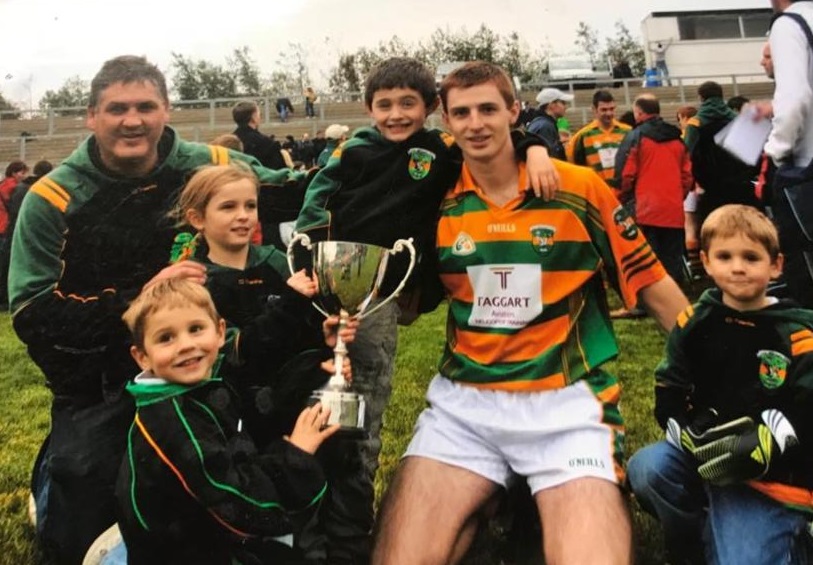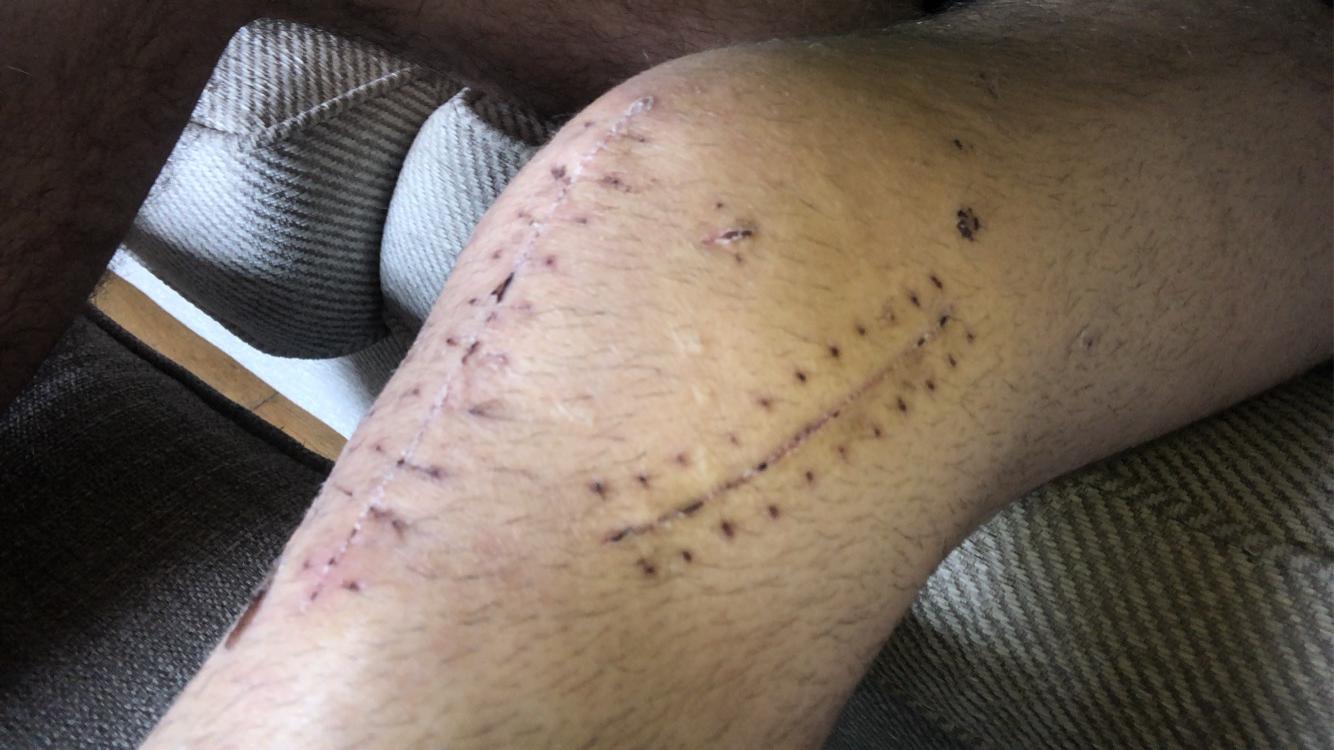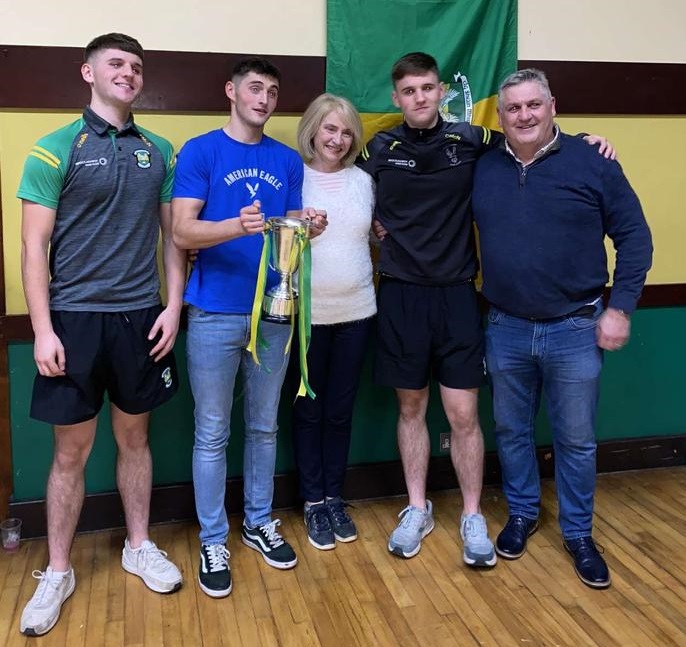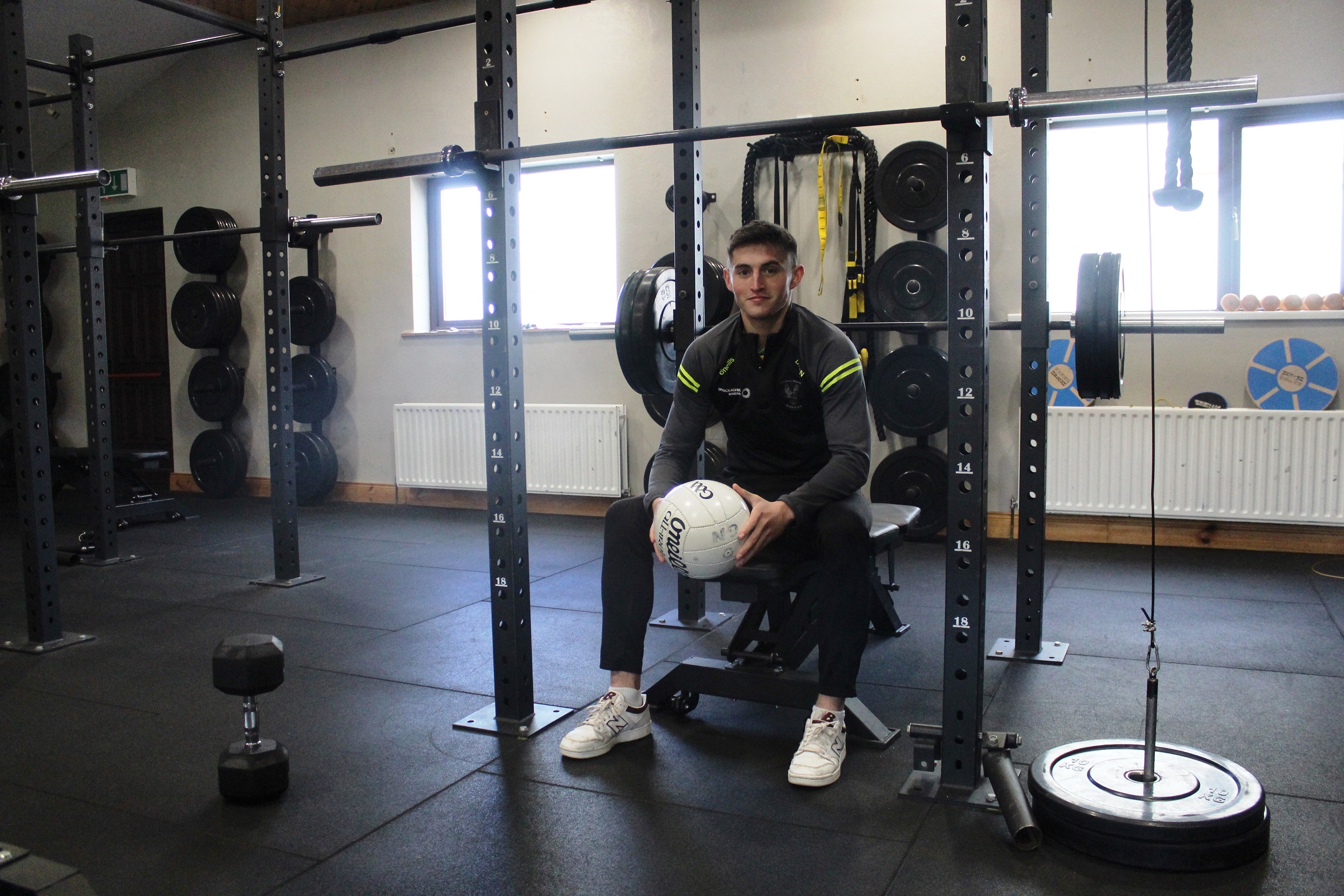Diarmuid McNicholl has a level of maturity well beyond his 24 years. With his litany of major setbacks, you soon appreciate why. Michael McMullan went to meet him.
CELEBRATING a broken leg not being a third cruciate injury tells how dark four years of injury hell were for Diarmuid McNicholl.
Two years later and seated in the Glenullin dugout, he looks across the same sod. He can still see the imposing figure of Traglach Bradley. The ball is looping in the air.
It’s days after winning the 2022 Derry Intermediate title. Ulster beckons. Glenullin are finalising plans for eventual All-Ireland finalists Galbally.
Possession isn’t worth a full-hearted challenge. Staying in cotton wool is more important. Championship week is all about the Sunday.
“He is not somebody to be running into,” McNicholl said of Bradley. “I tried to avoid him so none of us would get hurt.”
But it was too late. McNicholl was in a heap. He recognised the click. The knee went up like a balloon. The symptoms appeared way too similar. He was still able to walk.
He’d been down the road twice. There was more. It also took two operations to fix a broken hand. At the time, a test revealed an irregular heartbeat. After being through the ringer, McNicholl was back at base camp.
“I was just sort of getting prepared to hear the bad news,” McNicholl recalls.
A scan flagged up a tibia plateau fracture at the top of the shin. The inner workings of the knee were left intact. It wasn’t more cruciate hell. Phew.
“I was absolutely buzzing,” McNicholl recalls. “You’d rather have a broken bone than a ruptured ligament…a broken bone is going to heal a bit easier.”
It was the first time consultant Chris Connolly witnessed someone celebrating a broken leg.
Having not played his part in Glenullin’s success, McNicholl made himself a promise. He’d be on the inside looking out the next time.
The empty feeling drove him on. A broken bone was never going to stop him. Six months on, he was more motivated than ever.
Growing up in Glenullin, football is everywhere. McNicholl touched down in San Francisco on Monday. A summer of ball with the Ulster club beckons. It’s now or never. The real working world is just around the corner.
The summer months kicking ball is the luxury an injury-ravaged spell looked to have closed out.
***
Growing up, McNicholl looks back to the early sessions in Glenullin hall. And to Basil and Colm Rafferty overseeing his minor football. His friends are still there in the senior camp.
When Glenullin won the 2007 senior title, he was too young to inhale the deep substance of it all. He was just one of the young cubs messing around at the games.
Moving on to St Patrick’s, Maghera, the extraordinary college career of his father Dermot became apparent. At home, the photos and jerseys are stashed away. There was the odd peek at the medal collection.
“He just didn’t put any pressure on you and that’s a good thing,” Diarmuid said of his father’s approach. “He was a very…he’s still a very caring man. He would breed into you the correct dynamic of always putting your team mates first, about working hard and just fighting for the jersey.”
As a first year in St Patrick’s, the pressure began. The odd innocent teachers’ remark asking if he’d walk in his father’s shoes would strike a chord. The photos on the walls a reminder.

WINNING FEELING…Diarmuid McNicholl hugs Gerard O’Kane after Glenullin’s 2007 Senior Championship success. Also pictured is his father Dermot, the club’s 1985 winning captain, his sister Deirbhle and twin brothers Feargal anc Callum

WINNING FEELING…Diarmuid McNicholl hugs Gerard O’Kane after Glenullin’s 2007 Senior Championship success. Also pictured is his father Dermot, the club’s 1985 winning captain, his sister Deirbhle and twin brothers Feargal anc Callum
“You’re like ‘Jesus this man’s got quite a bit behind him’ because he obviously doesn’t chat about it in the house,” McNicholl said of the move from a quiet primary school in Glenullin to a MacRory Cup powerhouse.
“It was maybe hard to enjoy the football. You’d maybe develop a lot of fear of making mistakes. You didn’t want to tarnish his name so it was very hard as a 12, 13 or 14 year old growing up sort of in that environment.”
Back in Glenullin, he just continued to play football with his mates. As the teenage years began to close out, he was in with the seniors.
The underage teams he played on weren’t brimming with the numbers there now. Glenullin u-14, u-16 and minor teams are now playing in the upper grades.
Across from the main pitch, there is a 4G pitch. Beyond it is a ball wall. Coaching is accessible 12 months a year. The gym is equipped with everything that is needed.
Coming out of his own underage career, Colm Rafferty handed McNicholl his senior debut. When Coleraine squeezed out Glenullin on their way to the 2018 title, he shone in defeat, looking like he belonged. Rafferty just wanted players who gave their all.
“That year of senior was really enjoyable because it was the debut season and there wasn’t a lot expected of you. You were just able to go out and enjoy yourself,” McNicholl recalls.
It should’ve been the beginning. But it wasn’t. Now studying physiotherapy, he wishes he knew then what he knows now.
***
It was the 2019 off season. Glenullin pitch hall was the spot for a bit of leisurely soccer among mates. If numbers were big, they’d head off to the 4G pitch.
The tempers could rise. Nobody likes losing. It a scene you could picture anywhere in sport.
There was a random 50-50 ball to be won. It happens hundreds of times. Up against Conor Rafferty, McNicholl came off second best. There were the minutes of intense pain before it subsided.
“I was able to get up and hobble about and I was thinking maybe it’s not too bad but, no, it turned out I’d done the cruciate,” McNicholl recalls of his first downhill moment.
With the operation done, there was the naïve assumption that all would be fine. At 19, he’d be a quick healer. Squats and deadlifts and Nordic curls would sort it all. Sure it was a piece of cake.
“To throw a spanner in the works, I ended up breaking my hand in December,” McNicholl added.
It needed a second operation and during the checks, an irregular heartbeat was detected leading into a year of investigations, scans and treadmill tests.
There was the shock followed by fear. As someone also active outside of his football, there was the concern of a cardiac arrest.
“That was a real hard part of my life…there just was a lot going on,” McNicholl said. “You’re trying to recover from a hell of a lot and you kept getting hit by all these things.”
It was stressful for the family but Diarmuid buried his head in the sand. He just wanted it all to go away. Letters from appointments were binned for fear he’d rock up only to be told he’d have to quit sport.
“I was thinking maybe if I ignore this it’ll go away but I was lucky enough,” he explains. “I still do have to get it monitored every now and again.”
All the while, the cruciate rehab continued. He didn’t know it at the time but there was more to it than building up around the knee.
In the first game back, against Emyvale, the ball broke from the throw in. The foot was planted. A twist followed by a click.

UNDER THE KNIFE…Diarmuid McNicholl has recovered from two serious knee injuries
“I didn’t think anything really of it,” he said. “I played the rest of the game and was having to run after Ryan McAnespie.”
The knee began to swell again. The cruciate was torn and the home truths came home to roost. The road back was steeper than it looked. The second operation came with the complication of a patellar graft.
There was also the frustration of looking on as Glenullin lost a relegation play-off to Slaughtmanus but a restructure of the leagues stalled a drop to the junior ranks.
Paddy Bradley came in as manager for the 2022 season and built a management team with an initial focus of changing the club’s culture.
“I’ll be honest, the club was more of a Sunday League club. You just did what you wanted so the boys (management) were great in bringing in that mind-set and a bit of structure,” McNicholl pointed out.
For him, it was a case of keeping the head down despite the mental challenges around every corner.
Even watching an u-16 game brought demons, looking on as a player planted his foot to turn out of a tackle. It was the same seeing one of the seniors pluck a high ball before landing on one leg.
“It would just put you in bad form and that’s whenever you started to question yourself, asking when I can get back to this level,” McNicholl said of the mental challenge.
From the gym window, he’d see the seniors training. They’d be at full pelt and then chatting afterwards about how things were ticking along.
Now seated in the dugout, looking across the same pitch, he reflects on the help he received from all quarters. There were tears on the sofa at home. How was he going to get back?
Twin brothers Callum and Feargal, along with Cathal Hassan, would join him in a spin to Portstewart for coffee after training.
Manager Paddy Bradley knew the drill from his own cruciate problems. Teammate Neil McNicholl was another shoulder to lean on, having trudged the recovery path. There were also the nuggets of advice from physios Marty Loughran and Síofra O’Mullan.
“They were great in teaching you how to land…all that was missing in my first rehab,” McNicholl points out.
Squatting “triple figures” didn’t matter unless the knee could plant, change direction and break into a sprint.
“They were great for, just the full education behind the whole thing,” he added, telling of how their explanations interested him enough to swap an engineering degree to study physiotherapy.
Aside from football, he has a mission. To steer any teenage cruciate victim down the path he followed for his second rehab.
“Surgeons should consider, before even going into the knee, to make sure somebody has something set up whenever they’re coming out,” he said of the missing link.
***
It’s days before the 2022 intermediate final and Diarmuid McNicholl is back playing without really being match fit.
He understands Paddy Bradley can’t really consider him for the starting 15 but he pushes for a spot nonetheless. Game time is reduced to challenge games.
“I wouldn’t have expected him to put me in but you’re clinging on to that hope,” McNicholl said. “On the bench, you’re sitting, you’re thinking, maybe he will throw me in.”
There isn’t the same sense of belonging to the struggle. Anger can build up. McNicholl remembers nearly coming to blows with Dónal Close ahead of their final. The following week, they’re side by side on the bus to Celtic Park.
Drumsurn dominate the early stages but Glenullin hang tough long enough to find their feet before Daniel O’Kane kicks a dramatic winner.
Bedlam. That’s the only way to describe the scenes after a game won by the last throw of the dice. Dermot O’Kane and Felix Kilmartin are called into the heat of battle. Diarmuid McNicholl’s number 18 jersey remained unused.
He is happy for his teammates but there is disappointment at not really being involved.
His father Dermot hugs him but Diarmuid can still see the images of him hugging everyone else with the nagging feeling they deserve their medals more.
“You’re walking around with that that lump in your throat and you just didn’t really feel like you’ve carried your weight,” he said of a feeling he never forgot.
There were tears on the bus home, the shame of having missed the boat and worrying there wouldn’t be another chance.
He made a promise he’d never feel it again. The broken leg sustained at training days later, ahead of their Ulster campaign wasn’t going to define him.
It would drive him all the harder. Any pain during the rehab wouldn’t come close to that emotional agony of regret.
“Whenever I broke the leg, I went into the changing rooms and I was sitting with my head in the hands,” McNicholl adds. He can remember words of consolation offered in his direction.
Football wasn’t just going to be. They were caring words but the last thing a footballer wants to hear.
Derry’s restructure didn’t grant promotion to the intermediate champions, so Glenullin went twice as hard at retaining their title. Extra fuel was a narrative they didn’t deserve the first one.
Diarmuid McNicholl had extra motivation. Tiny steps at first. It was all about getting back on the grass. That’s why 60 minutes against Foreglen reserves were bliss. A return to play. To start a game and to finish. A milestone. He could twist and turn and take a hit.
Now it was full steam ahead with the management entrusting him with key marking jobs on their way to retaining their title.

TITLE TIME…Diarmuid, Dermot, Ita, Callum and Feargal McNicholl celebrate Glenullin’s 2023 championship success
It’s a season that could well have ended up in Croke Park with inches separating them from Ballyhaise who outplayed Cullyhanna for much of the Ulster final.
On the flip side, it was also a season that could’ve crashed. They needed to dig deep at times. There were moments to grind and there was an extra-time classic with Drumsurn.
The final itself looked to be slipping away before Glenullin took Banagher to extra time to finish the job.
The never say die words of Colm Rafferty echo in McNicholl’s ears. Always keep on trucking.
A rigorous training block had also tuned their engine. High above Glenullin pitch is Brockaghboy wind farm. Their logo is not only on their playing year, it’s where the group’s character was crafted.
“We did a lot of tough running up there,” he explains.
“You would see T13 written on a lot of our balls and on our hands. That’s the tallest turbine in the wind farm. Whenever things are getting tough you would hear boys passing the message – just remember T13.”
“If you go around asking people who deserved to win that game, from the outside people would say Banagher,” McNicholl admits.
“If they knew the work that was put in, in the background, from our part, they’d understand.”
Giving up wasn’t an option. Not for Glenullin and certainly not for Diarmuid McNicholl. The hugs after the final whistle were twice as hard. A release. Tears of pain were now tears of joy.
“I owe my family a hell of a lot that you’d nearly get emotional thinking about it,” he said. “The four years, it wasn’t easy. You’d have a lot of anger built up.
“I probably wouldn’t have been the easiest to chat to around the house but they’d still have your back. A lot of nights spent on the sofa, crying to your mammy.
“If you would have said that to a 19 year old me that this injury is going to leave me in that sort of position I would have laughed, so, I owe them a hell of a lot.”
For now, Diarmuid McNicholl’s family is the San Francisco Irish community. A summer well deserved.
Beyond that, Glenullin’s bid for a third intermediate title will follow before another year of study.
In the years to come, any athlete knocking on his door for rehab advice won’t be in any better hands. He has sat on their side of the table often enough.
Check out this week’s Gaelic Lives podcast for the full interview with Diarmuid McNicholl. Now available via Spotify.
Receive quality journalism wherever you are, on any device. Keep up to date from the comfort of your own home with a digital subscription.
Any time | Any place | Anywhere












